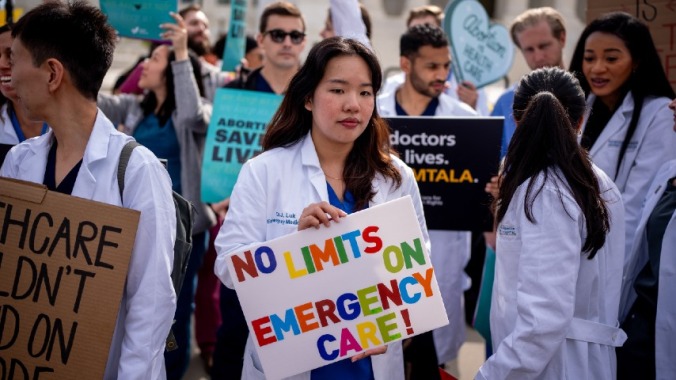Sepsis, Delayed Chemo, a Canceled Liver Transplant: Study Shows Abortion Bans Cause Substandard Care
Doctors are denying patients emergency abortion care and, in some cases, other health care services because of their pregnancies—and their state's abortion bans.
Photo: Getty Images AbortionPolitics Abortion
In one state where abortion is banned, a patient who was 19 to 20 weeks pregnant was sent home from the hospital, despite doctors determining that she was experiencing painless cervical dilation and protrusion of the amniotic sac through her cervix. The next day, she returned in severe pain and advanced labor. According to one physician familiar with the situation, multiple members of her health care team declined to be involved because of the state’s active abortion ban, fearing prosecution. “Anesthesiology colleagues refused to provide an epidural for pain,” the physician recounted. “They believed that providing an epidural could be considered [a crime] under the new law.”
They continued, “I will never forget this case because I overheard the primary provider say to a nurse that so much as offering a helping hand to a patient getting onto the gurney while in the throes of a miscarriage could be construed as ‘aiding and abetting an abortion.’” The physician called this “a gross violation of common sense and the oath I took when I got into this profession to soothe my patients’ suffering.”
This testimony is one of 86 physician stories that the research organization ANSIRH (Advancing New Standards in Reproductive Health) of the University of California, San Francisco collected between September 2022 and August, from states with abortion bans. The new study, published Monday, details dozens of similarly horrific anecdotes and concludes that, since 2022, abortion bans have led to pregnant people receiving substandard, sometimes life-threatening medical care.
Dr. Daniel Grossman, the lead author of the study, told the Guardian that ANSIRH began collecting this research amid all the alarming stories in the immediate aftermath of Dobbs. “One question that we had was: were the changes that we were seeing initially related to the initial shock of the Dobbs decisions and the laws that then went into effect? Would clinical protocols kind of adjust and healthcare providers would figure out how to provide high-quality care? Would these poor-quality cases disappear?” But through their research, Grossman and his team found that “these cases are continuing to happen.”
In states with abortion bans, doctors are denying or delaying emergency care due to the ambiguity around the bans’ medical exceptions, particularly around what qualifies as “life threatening,” forcing many doctors to wait until patients are on the brink of death to act. Texas and Louisiana, for example, threaten doctors with life in prison and up to 15 years in prison, respectively, if they provide abortion care to a patient who’s condition is later deemed not life-threatening enough. Delayed care can lead to loss of fertility, chronic pelvic pain, or even heart attack and stroke related to uncontrolled hypertension—not to mention long-term impacts on mental health, ANSIRH researchers concluded.
-

-

-

-

-

-

-

-

-

-

-

-

-

-

-

-

-

-

-

-

-

-

-

-

-

-

-

-

-

-

-

-

-

-

-

-

-

-

-

-








































